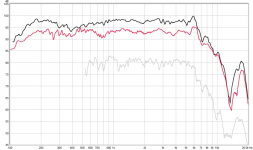I agree with 90% of your post, but not this bit.A 6" will tend to have too many resonance issues at high frequencies compromising the tweeter by forcing it to operate too low or simply compromising the midrange sound quality. Look at midfield studio monitors or higher quality home audio towers to get a feel for the configurations that work well.
I bought a pile of 6" midrange drivers for projects because they were cheap and efficient and good: their big breakup spike is way up in super tweeter territory. This dark lines on the plot are on-axis measurements using different baffles. Most of the irregularities move between plots (i.e. are caused by the baffle, not the driver) - the only exception is the breakup at 6kHz, which is very mild, and the spike near 20kHz.
The pale grey trace is the average of several measurements taken @ 1 metre, 15-20degrees off axis, i.e. trying to make a microphone approximate what a non-rigid lister with more than one ear might actually hear.
There are many other drivers, of similar size, just as good as this one.
the pic is from post 26 of this thread: https://www.diyaudio.com/community/threads/measurement-based-cone-damping-treatment.309501/page-2
Attachments
Sometimes a hybrid solution is good - it gives most of the benefits of full active, but with less stuff (amps and cables), and less $$.Decades ago active crossovers became superior to passive crossovers in terms of flexibility and performance. They are also cheaper for manufacturers although not necessarily for DIYers. If you are starting out and reasonably comfortable with computing committing to legacy technology like passive crossovers rather than active may not be wise. This will of course depend on where you want to go and what you want from the hobby. Many here have invested in learning about and building up boxes of components for passive crossovers and are wholly content to stick with them.
e.g. for a 2-way + subs build, you might go for an active X-over to handle the low crossover, and a passive crossover up high, where this "legacy technology" is small and cheap.
My brother has a pair (but not the sub that goes with it). I'll borrow them and try them in my room. See if they suffice or not.Can you simply find out for yourself? For example, could you buy or borrow something like these and give them a trial?
http://noaudiophile.com/JBL_LSR305/
Note that this chap also reviewed the larger version, and thought they sounded just OK on their own, but great with a sub.
If I'm not mistaken I should connect them with my AVR using the pre-outs from my AVR right?
Active speakers like the JBL LSR305 take line level input. Like from the pre-out of a receiver.If I'm not mistaken I should connect them with my AVR using the pre-outs from my AVR right?
All this fear of beaming from 6" or 8" woofer I find weird. My 15" SP2-XT was only 3 db down over 22 degrees off axis from 54 to 1200 hz where the CD horn took over, and maintained same level off axis to 16 khz. My SP2(2004) with 15" is above 6 db down 54-17khz 90 deg horizontal and 40 degree vertical. Box & woofer design.
Main thing wrong with them, they have pawnshop value and the XT pair were stolen. My diy replacement will be UGLY, not worth stealing.
Last edited:
That's handy. Please share the results.My brother has a pair (but not the sub that goes with it). I'll borrow them and try them in my room. See if they suffice or not.
IF you position the sub(s) near to the mains (e.g. use a pair of subs as stands for the 5" mains)
AND you can apply a filter before the mains
THEN you essentially have a 3-way that is split into two cabinets.
In this configuration, the 5" should suffice unless you like your music extremely loud - because highpassing the 5" gives a lot more capability. Play with the numbers a bit, and you'll see what I mean:
http://www.baudline.com/erik/bass/xmaxer.html
If you choose "solve for dB", you should see the SPL jump by 12dB if you raise the "Hz" from 40 --> 80.
Will definitely update all you helpful gentlemen.
It will take a few days.
I have 1 sub but it's too big to move around. It's behind me in the corner.
95 dB is my absolute maximum listening level. Mostly it's in the 80-85 dB range.
And that's a handy website! I have bookmarked it. Thank you!
Idk if this is related but when I built my first ever subwoofer last month, my mains play cleaner and louder/aggressive with a sub. I have to listen at a lower volume now otherwise it's too much for me.
It will take a few days.
I have 1 sub but it's too big to move around. It's behind me in the corner.
95 dB is my absolute maximum listening level. Mostly it's in the 80-85 dB range.
And that's a handy website! I have bookmarked it. Thank you!
Idk if this is related but when I built my first ever subwoofer last month, my mains play cleaner and louder/aggressive with a sub. I have to listen at a lower volume now otherwise it's too much for me.
Hi @wolf_teeth - where can I read more about your nice design here? It kind of matches an idea I had for the TVHow about a 1+3+5.25 3-way? 0.23ft^3 PR box... SB 5*8" PR on the back for F3/10 of 52/38Hz anechoic. In room about 3' from walls these things can DIG.
View attachment 1048397
At this point, not much more than what I posted here. I have not posted the finale or build thread as it could be proprietary. If it will be public, be assured it will have info posted at the various sites. I'll know after this weekend...
- Home
- Loudspeakers
- Multi-Way
- 2 vs 3 way
